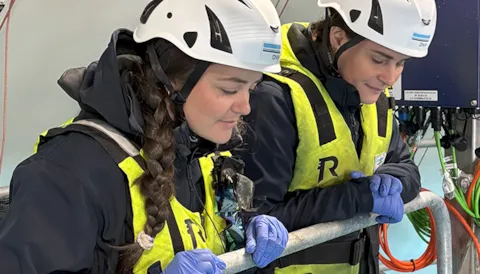Why certified steel is no longer optional: Navigating the new standard with ResponsibleSteel™
The steel industry is at a defining crossroads. As one of the most carbon-intensive sectors globally, it plays a pivotal role in the world’s journey toward net-zero. But with rising stakeholder expectations, stricter regulatory requirements, and increasing scrutiny around “greenwashing,” companies are being asked to do more than just promise – they must prove.
This is where ResponsibleSteel™ certification comes in and where DNV is helping lead the way.
The demand for responsible steel is growing
Regulations, such as the EU’s Corporate Sustainability Reporting Directive (CSRD) and the upcoming Carbon Border Adjustment Mechanism (CBAM), are setting clear expectations for emissions transparency, supply chain due diligence, and ESG integration. At the same time, customers are increasingly willing to pay more for low-carbon steel. However, they want credible data and verified claims.
With mounting pressure from regulators, investors, and buyers, steel producers must demonstrate that their operations and their supply chains meet robust environmental, social, and governance (ESG) standards.
What is ResponsibleSteel™?
ResponsibleSteel™ is the first global multi-stakeholder standard and certification initiative for the steel industry. It provides a framework to assess and verify performance across 13 principles, from climate change and water stewardship to human rights and labour practices.
ResponsibleSteel™ certification gives stakeholders confidence that a steelmaking site is committed to responsible sourcing, sustainable production, and continuous improvement.
Supporting the transition to responsible steel
Certification to the ResponsibleSteel™ Standard requires more than technical compliance, it demands a clear understanding of ESG risks, stakeholder expectations, and sector-specific challenges.
As an accredited certification body, DNV provides independent third-party assessment services to verify alignment with the ResponsibleSteel™ principles. These assessments are conducted by experienced auditors familiar with both global standards and local operating contexts.
The certification process typically includes:
• Independent, evidence-based evaluation against the full ResponsibleSteel™ Standard
• Sector-specific knowledge to address the unique complexity of steel production
• Risk-based audit planning to focus on material ESG issues
• Global delivery capabilities supported by local expertise
In addition to certification, organizations may also benefit from identifying areas for improvement in governance, stakeholder engagement, and supply chain oversight which are key elements in achieving credible, long-term sustainability performance.
Why certification matters more than ever
Certified steel isn’t just about ticking a compliance box. It signals leadership in a fast-changing market. It supports access to green financing. It builds customer trust. And in a world increasingly shaped by ESG-driven decision-making, it helps secure a resilient and competitive future.
Whether you’re just beginning your journey or ready to certify multiple production sites, DNV is your trusted partner in making sustainable steel a reality.
Discover the future of green steel
Want to learn how digitalization is enabling businesses to balance sustainability and efficiency in green steel production?
Our latest report, Shaping the Future of Sustainable Steel: Lessons from Europe’s Steel Industry, explores the challenges, opportunities, and innovations driving the green steel transition.
Featuring insights from ArcelorMittal, ThyssenKrupp Materials Services, Tata Steel UK, and MCB Group, the report covers:
• Emission-reducing technological transformations
• Market dynamics and regulatory pressures
• The importance of third-party verification
• How digitalization ensures transparency and tracks emissions
Download your copy now to gain valuable insights on the green steel revolution and its impact on supply chain sustainability.
7/30/2025 7:57:00 AM





